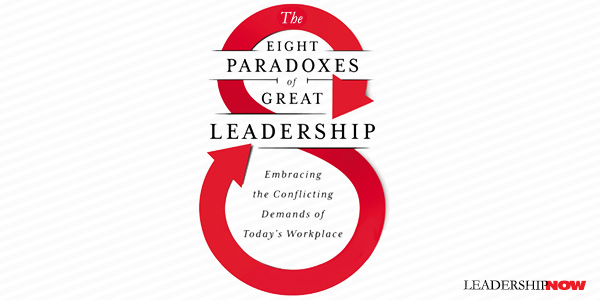 |
 |
01.14.22

The Eight Paradoxes of Great Leadership
LIFE is full of paradoxes. Sometimes we move forward by backing off, performing while being reflective, being an extrovert and an introvert, leading and following, confident and humble. Paradoxes are not to be solved but managed. It is a continuum to move along. It requires a heightened level of awareness. Leaders bring clarity to these paradoxes. In The Eight Paradoxes of Great Leadership by Tim Elmore, he covers eight such paradoxes of uncommon leaders. In such volatile times, embracing these paradoxes is critical for effective leadership. Leadership is seldom easy, but today it affords us the challenge of collaborating with a more educated, more entitled, more savvy population that has greater expectations of satisfaction and rewards than in past generations. Uncommon leaders stand out because they are able to juggle seemingly contradictory traits to lead such people. Emore introduces many great concepts and (sometimes very moving) stories to illuminate these paradoxes. He gets into the nitty-gritty of what these paradoxes look like or how they are practiced in everyday situations. I’ll just give you a flavor of each, so you get the idea of where Elmore is headed with these paradoxes and how you might begin to recognize them in your own leadership. Paradox #1: Uncommon Leaders Balance Both Confidence and Humility Leading today requires combining these two attributes—confidence and humility. Reality changes so quickly, leaders cannot become arrogant, but remain in a learning posture. At the same time, team members long for their leaders to inspire them with confidence. Paradox #2: Uncommon Leaders Leverage Both Their Vision and Their Blind Spots Vision gives leaders (and teams) a direction, but blind spots are often the very motivator that enables them to approach an idea in an unconventional way—and believe they can pull it off. Most new ventures require a leader to possess a clear target they want to hit. At the same time, their inability to see all the obstacles or challenges ahead of time helps them to maintain their energy as they try to hit their target. In short, leaders usually have to see something and fail to see something to reach their goal. When Elmore talks about blind spots, he’s talking about rookie smarts. He’s not talking about the blind spots of character that lead us to the wrong choices. Regarding these kinds of blind spots, he notes, “Our blind spots are often found conspicuously close to ur strengths.” Paradox #3: Uncommon Leaders Embrace Both Visibility and Invisibility In the beginning of any mission, most people need a visible leader, demonstrating what to do and clarifying the goal. Over time, however, these people need the leader to step aside to let them realize their potential. Paradox #4: Uncommon Leaders Are Both Stubborn and Open-Minded Leaders will never reach a goal without being strong-willed. Without a stubborn will, obstacles will stop them. At the same time, they’d be naïve to think they have all the answers at the beginning of a venture. They must be open to voices of counsel; to flex and to adapt to changing realities. Paradox #5: Uncommon Leaders Are Both Deeply Personal and Inherently Collective People need big-picture vision from their leader, someone who grasps the gravity of what’s happened, and the steps required to respond to it. At the same time, people need a leader who empathizes with their personal journey; someone who understands how the struggle feels to individuals, and who articulates the vision with a personal touch. Elmore adds, “Wise leaders seemed to understand their people and offered three gifts:” context to problems, applications (practical action steps), and belief (hope for a better future). Paradox #6: Uncommon Leaders Are Both Teachers and Learners In our day of unceasing change, leaders are forced to be teachers, and organizations are forced to adapt. To do this, however, these leaders must first and foremost be lifelong learners, always adapting and never resting on what they know. Leaders are both receptacles of information and libraries of information. Paradox #7: Uncommon Leaders Model Both High Standards and Gracious Forgiveness The paradox of this uncommon leader is their propensity to forgive people. It’s not that they lower their standards. It’s simply that they’re able to absolve a team member who acknowledges they failed to meet the standard and chooses to improve. Forgiveness isn’t approving what happened. It’s choosing to rise above it. Forgiveness does not remove the past, but it does expand the future. Paradox #8: Uncommon Leaders Are Both Timely and Timeless Uncommon leaders in the twenty-first century must balance this very difficult paradox. First, they must embrace and advance timeless principles that make for lasting success, values that have stood the test of time and worked in all generations and in every context. At the same time, these leaders must leverage culturally relevant methods and futuristic resources. Elmore says that leadership approaches have changed over the last seventy years. And so they have. He says we are now in the time of the Poet-Gardener. The Poet-Gardener possesses these ten characteristics:
They are very aware leaders and read situations before they lead them. As a result, they practice paradoxical leadership as a norm. 
Posted by Michael McKinney at 09:52 AM
|
BUILD YOUR KNOWLEDGE
 

How to Do Your Start-Up Right STRAIGHT TALK FOR START-UPS 
Grow Your Leadership Skills NEW AND UPCOMING LEADERSHIP BOOKS 
Leadership Minute BITE-SIZE CONCEPTS YOU CAN CHEW ON 
Classic Leadership Books BOOKS TO READ BEFORE YOU LEAD |